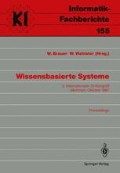Zusammenfassung
Die strategische Bedeutung des Einsatzes Wissensbasierter Systeme liegt in der veränderten Zielhierarchie für diese Informati-onstechnologie. Lag der Schwerpunkt beim Einsatz der Datenverarbeitung in der sicheren und schnellen Erledigung komplexer numerischer Vorgänge und brachte die Informationsverarbeitung Datenbestände und Vorgänge bis an den Arbeitsplatz, so liegt der Schwerpunkt bei der Wissensverabeitung in der qualitativen Verbesserung von Entscheidungs- und Produktionsprozessen. Nicht die vorgangsorientierte Bearbeitung von Aufgaben steht im Vordergrund, sondern das ergebnisorientierte Bewältigen von neuen Situationen.
Access this chapter
Tax calculation will be finalised at checkout
Purchases are for personal use only
Preview
Unable to display preview. Download preview PDF.
Literaturhinweise
J. Allen und A. Anjewierden: »KADS Power Tools: User Interface Specification« ESPRIT P1098 Working Paper, 1987
A. Anjewierden und J. Allen: »KADS Power Tools: User Guide« ESPRIT P1098 Working Paper, 1987
S. Barthelemy, G. Edin, E. Toutain, S. Becker: »Requirements Analysis in KBS Development« ESPRIT P1098 Deliverable D3 1987
S. Becker, R. Nobis, M.-J. Schachter-Radig, T. Siegfried, D. Wermser, S. Barthelemy, G. Edin, E. Toutain: »An Assessment of Life Cycle Models« ESPRIT P1098 Deliverable G6, 1986
J. Breuker und B. Wielinga: »Models of Expertise« Proc. 6th European Conf. Artif. Intell., Brighton 1986
J. Breuker, B. Wielinga, M. van Someren, R. de Hoog, G. Schreiber, P. de Greef, B. Bredeweg, J. Wielemaker, M. Davoodi, S. Hay ward: »Model Driven Knowledge Acquisition Interpretation Models« ESPRIT 1098 Deliverable Dl, 1987
W.J. Clancey: »Heuristic Classification« Artif. Intell. 27, 1985, S. 215–251
W.J. Clancey: »The Science and Engineering of Qualitative Models« KSL Working Paper 86–27, 1986
G. Goos: »The Relationship between Software Engineering and Artificial Intelligence« in Industrial Software Technology, R. Mitchell (Hrsg.), P. Peregrinus, London 1987
C.C. Hayball: »KADS and Object Oriented Design« ESPRIT P1098 Working Paper 1986
P. Johnson und S. Gruber: »Specification of Expertise: Knowledge Acquisition for Expert Systems« AAAI Workshop on Knowledge Acquisition for KBS, Banff, Canada 1986
T. Maibaum: »Role of Abstraction in Program Development« in Information Processing 86, H.-J. Kugler (Hrsg.), Elsevier, Amsterdam 1986
T. Nelson: »Replacing the Printed Word: A Complete Literary System« in Information Processing 80, IFEP, North Holland 1980
G. Persch: »Automating the Transformational Development of Software« in Industrial Software Technology, R. Mitchell (Hrsg.), P. Peregrinus, London 1987
»PRADOS Projektabwicklungs- und Dokumentationssystem der SCS« SCS GmbH Hamburg 1983
P. Rooke und M. Readdie: »A Study in the Commercial Application of the KADS Methodology« ESPRIT P1098 Working Paper, 1987
S.A. Hayward: »How to Build Knowledge Based Systems: Techniques, Tools, and Case Studies« ESPRIT Techncal Week, Brüssel 1987
M.-J. Schachter-Radig: »Wissenserwerb und -formalisierung für den kommerziellen Einsatz Wissensbasierter Systeme« in GI-Kongress’85: Wissensbasierte Systeme, W. Brauer, B. Radig (Hrsg.), Springer-Verlag Berlin Heidelberg 1985
M.-J. Schachter-Radig: »Development of Knowledge Based Systems: New Ways for the Development of Software Systems« in Industrial Software Technology, R. Mitchell (Hrsg.), P. Peregrinus, London 1987
M.-J. Schachter-Radig: »Expertensysteme« in CIM-Handbuch, U.W. Geitner ( Hrsg. ), Vieweg Wiesbaden 1987
A.I. Wasserman, H. Freeman, N. Porcella: »Characteristics of Software Development Methodologies« in Informa-tion Systems Design Methodologies: A Feature Analysis, T.W. Olle, H.G. Sol, C.J. Tully (Hrsg.), North Holland, Amsterdam 1983
P. Wegner: »Capital Intensive Software Technology« in IEEE Software, Vol. 1 Nr. 3, Juli 1984
J. Wielemaker: »The Design of KLASS« ESPRIT P1098 Working Paper, 1987
Author information
Authors and Affiliations
Editor information
Editors and Affiliations
Rights and permissions
Copyright information
© 1987 Springer-Verlag Berlin Heidelberg
About this paper
Cite this paper
Schachter-Radig, MJ. (1987). Modellgesteuerte Problemanalyse — Grundlage für den Lebenszyklus Wissensbasierter Systeme. In: Brauer, W., Wahlster, W. (eds) Wissensbasierte Systeme. Informatik — Fachberichte, vol 155. Springer, Berlin, Heidelberg. https://doi.org/10.1007/978-3-642-88719-2_39
Download citation
DOI: https://doi.org/10.1007/978-3-642-88719-2_39
Publisher Name: Springer, Berlin, Heidelberg
Print ISBN: 978-3-540-18494-2
Online ISBN: 978-3-642-88719-2
eBook Packages: Springer Book Archive

